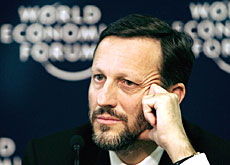WEF participants pick “tough choices”

Participants at the annual meeting of the World Economic Forum say eradicating poverty will be the key challenge this year.
A fairer globalisation process and combating climate change are next on the list of “tough choices” that will have to be addressed by world leaders.
Other key issues are ensuring basic education for all, the pursuit of peace in the Middle East and improving “global governance”, according to participants at the five-day forum.
And there was even a Swiss touch to the theme selection process – in the form of a so-called Global Town Hall meeting that introduced an element of popular democracy into this year’s proceedings.
WEF media director Mark Adams told swissinfo that the Town Hall gathering was based on the concept of direct political “engagement”, first introduced by the Swiss in the 15th century.
For the first time in the WEF meeting’s 35-year history, it gave the majority of participants the chance to vote directly on what they saw as the “Top Six” challenges requiring immediate action by global leaders.
Doing enough?
Daniel Vasella, chairman and CEO of Swiss pharma multinational Novartis and a co-chair of the WEF meeting, said prior to the Town Hall session that global poverty was one challenge he believed to be of particular significance.
Speaking at a news conference on Wednesday, Vasella said he hoped this year’s meeting in Davos would encourage all present to “go away and implement pragmatic solutions in his or her sector”.
Asked about the role and extent of efforts by the pharma sector to eradicate poverty, Vasella told swissinfo: “Of course you can always do more. But do we do a lot? You bet we do.
“At Novartis alone, we contributed about $570 million (SFr675 million) last year to programmes for free and discounted drugs for needy people.
“If you add up what the pharma industry as a whole does, we are in the multi billion dollar area – more than many global institutions.”
Vasella added that, while the challenges were immense, with more than three billion people worldwide still living on less than $2 a day, considerable progress had also been made in many areas.
However, economic progress brought new challenges – for instance, the spread of Aids and migrant-worker instability in China, as well as rapidly increasing consumption of raw materials and oil.
Global agenda?
Poverty and the environment were also the main themes addressed by British Prime Minister Tony Blair, who gave the official opening speech in his capacity as G8 president.
Echoing the results of the Town Hall meeting, Blair said the main goal of his presidency would be to implement practical programmes to improve the plight of Africa and to combat the growing threat of global climate change.
On Africa, Blair said: “We cannot confront the endemic perpetual crisis of African poverty on any basis other than a partnership between African governments and those of the developed world.”
Speaking ahead of debates this week on global trade, Blair said Western nations should not just increase financial aid to poorer countries, but should “open markets and cut subsidies – including on controversial items such as cotton and sugar.”
On climate change, he said there was now a scientific consensus that action was needed, with countries like Switzerland witnessing “the retreat of glaciers that have not retreated since the end of the last Ice Age”.
However, he added that it was unrealistic to expect business leaders to act to reduce greenhouse gas emissions without “clear signals” from their political counterparts that the issue “was not going to go away”.
The French president, Jacques Chirac, also stressed the role of the corporate sector in tackling global poverty – and proposed the introduction of a “voluntary” tax to help fund solutions to “common challenges” such as the fight against Aids.
swissinfo, Chris Lewis in Davos
Top Six challenges agreed by delegates:
eradicate poverty
make globalisation fairer
combat climate change
ensure basic eduction
peace in the Middle East
improve global governance

In compliance with the JTI standards
More: SWI swissinfo.ch certified by the Journalism Trust Initiative









You can find an overview of ongoing debates with our journalists here . Please join us!
If you want to start a conversation about a topic raised in this article or want to report factual errors, email us at english@swissinfo.ch.